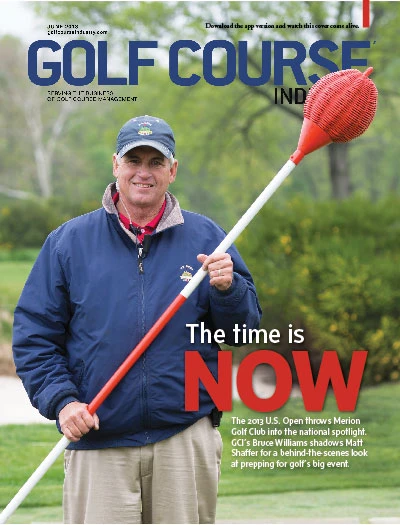 Not your typical course supervisor
Not your typical course supervisor
At Kauri Cliffs Golf Club, located on the North Island of New Zealand, golfers might spot an unusual sight when they approach the right side of the range. If they approach the steep hillside, they may catch a glimpse of Tiger, the resident goat and daredevil mower.
Because the hillside is too steep to mow by machine, the staff at Kari Cliffs wasn’t sure how to keep the area groomed.
“The right side of our range is very difficult to maintain; it’s just too steep to mow traditionally,” says Ryan Brandeburg, director of golf. “There’s a natural wetland at the bottom, and with the wind coming off the ocean – combined with the fact that most golfers slice – we lose thousands of golf balls over there.”
Enter Tiger. Named after the club owner Julian Robertson’s successful Tiger Fund, Tiger arrived at the course in 2011 to address the maintenance issue.
“She’s done a great job but we’ve realized we would honestly need 30 goats to tackle that job,” says Brandeburg. “We’ve also learned how expensive it is to keep a goat, even one as hard working and genial as Tiger. She drinks only clean water; we must hand-feed her these pellets to supplement her diet; we have to clean her goat house daily... I don’t think we could afford 30 more goats.”
Tiger isn’t kept enclosed on the hillside though. The goat has become a mascot of the club and can often be found in the pro shop or even driving a cart around the course. She is also very active on social media, and the staff at the club is considering the idea of putting a wireless camera on her, so people can see firsthand what she does on a normal day at the club.
2013 weather not golf-favorable
According to Weather Trends International, the forecast for 2013 is not on the sunny side, and definitely not as golf-friendly as 2012. At the National Golf Foundation’s recent Golf Business Symposium, WTI, an organization that provides global, 11-month weather forecasts, was asked two questions about the 2013 season. The first question was “Can we expect a repeat of 2012’s golf-favorable conditions this year?” The answer was a firm “no.” The first four months of 2013 had the coldest weather in 17 years, and 2013 also experienced the greatest one-year drop in temperature in over 125 years. Snow played a large factor this year as well. In March, 50 percent of the US was still covered in snow, as opposed to seven percent in 2012. All of these combined conditions have caused a delay in the golf season, whereas last year the dry, warm weather caused an early start.
The second question was “Is there anything that golf-related businesses can do ahead of time to mitigate the effects of bad weather, and take advantage of good weather?” WTI said there are several things the industry can do to improve their bottom lines:
- Accurate forecasts facilitate the strategic planning process.
- Knowledge of season-start timing on a local and regional basis can improve revenue forecasting.
- Inventory allocation and management can be adjusted based on expected regional differences in weather.
- Outings and events (e.g., club demo days) can be scheduled for days/weeks when weather is likely to be most favorable.
- Advertising and promotions can be timed and allocated properly to increase campaign ROI.
- Superintendents can save money, resources and effort by effectively timing watering schedules, fertilizer application, overseeding, etc.
 Investigating ‘Mini Ring’ Disease Biology, Ecology, and Control
Investigating ‘Mini Ring’ Disease Biology, Ecology, and Control
Since its first report in 1999, ‘Mini Ring’ disease has become a major problem for many golf courses in the SEUSA, and in many parts of the world where bermudagrass is grown on greens. On bermudagrass, mini ring consists of frog-eye (centers still green) circular patches 4 to 18 inches (10 to 46 cm) roughly in diameter that typically develop during hot, humid days of late summer and early fall when bermudagrass growth has slowed. Reasons for its increase are unknown, however, its occurrence has coincided with industry trends such as switching from Tifdwarf and Tifgreen cultivars on golf greens to shallow-rooted and thatch-producing ‘ultra-dwarf’ cultivars such as TifEagle, Mini Verde, and Champion bermudagrasses. Little prior agronomic research has been performed on this disease, leaving superintendents and scientists baffled on ecological and environmental parameters favoring its occurrence and spread, and with a very sparse database on which to base recommendations for management.
Recently, through its Round4Research fund raising efforts, the Carolinas Golf Course Superiendent’s Association has announced a three-year funding for this project.
The researchers are much appreciated to the CGCSA and its members for providing this funding and look forward to performing the research.
 Plug and save
Plug and save
The Bear Trace at Harrison Bay has recently become the first public golf course in America to start using all electric mowing equipment. Located in Tennessee, Bear Trace purchased the Jacobsen mowers for $414,000.
The cost is more than worth it however. The course started using the electric mowers on March 3, and in the first 60 days they cut 317 gallons of gas. In the same time, the electric bill for the course only rose $47.
The equipment is much quieter than gas mowers, also cutting down on sound pollution on the course.
“For years, the golf course industry had been labeled as a polluter,” course superintendent Paul Carter says. “Having the ability to use this equipment is going to make a world of difference. It’s going to make a difference for us as a crew, for the golfers who play here and for the wildlife.”
From the Feed
We’re all about making friends at GCI, which is part of why we’re glad to work with Bill Brown, the man behind Turf Republic and incidentally, our newest columnist. Another reason is Bill’s undying dedication to technology and social media for superintendents. Bill and our own Pat Jones attended this year’s Turf Science Live event in South Carolina – and Bill found plenty of opportunities to flex his tech muscles to show off the new industry innovations.
Turf Republic @TurfRepublic

Join the conversation on Twitter @GCIMagazine!

Explore the June 2013 Issue
Check out more from this issue and find your next story to read.
Latest from Golf Course Industry
- Editor’s notebook: Green Start Academy 2024
- USGA focuses on inclusion, sustainability in 2024
- Greens with Envy 65: Carolina on our mind
- Five Iron Golf expands into Minnesota
- Global sports group 54 invests in Turfgrass
- Hawaii's Mauna Kea Golf Course announces reopening
- Georgia GCSA honors superintendent of the year
- Reel Turf Techs: Alex Tessman





